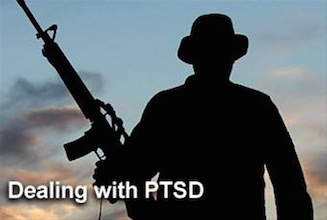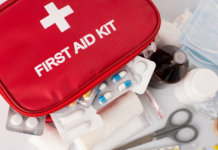THE SNIPER
Have you seen American Sniper yet? It’s something on everyone’s ear these days. The movie is based on a true but sad story of U.S Navy SEAL Chris Kyle who is sent to Iraq with one mission in mind; to serve and protect his brother-in-arms. Although there are many movies showing the Iraq war, none was able to entice a big audience- well until American Sniper which has been a huge success in U.S. Box office. The movie is action packed, thought-provoking, full of emotion, and incredible actor performance. However, it does not address the overall complexity of an another issues surrounding the war- PTSD (POST TRAUMATIC STRESS DISORDER).
American Sniper has prompted different opinions and arguments from the media, audiences, and critics regarding Iraq war, political issues, and cultural differences. However, few people realizes there should be another side of a story that requires a closer look and immediate action; which is the effects of PTSD in veterans.
THE SHOCK OF WAR
War veterans were the ones who first brought shell shock to public attention. Shell shock or battle fatigue, now a days, is referred as post-traumatic stress disorder or PTSD. It is an eviscerating and devitalizing mental disorder that follows experiencing or seeing an event, which is enormously dreadful, traumatic, or horrifying, like serious accidents such as car wrecks or plane crash, natural disasters such as earthquakes or tsunami, violent attacks such as rape, kidnapping, torture, being held captive or hostage.
THE GUILT
PTSD development depends on many things, which includes the intensity of the situation, the duration and proximity of the event at your position, the damage it brought to you physically, people you have lost, the help and support you received after the event, and your reaction after surviving a tragic event. As for some people, especially soldiers who suffered from trauma during the battle, they can experience survivor’s guilt. Like Chris Kyle’s story, he suffered from a mental condition, wherein he perceives himself as a person who had done wrong by surviving the war, when others did not, because he could not save them. They can experience depression, anxiety, mood swings, sleep disturbances, bad dreams, and loss of drive. Another thing, most people who have post-traumatic stress disorder re-live the trauma over and over again through perplexing retrospections during the day and bad dreams during the night. It also includes sleep problems, detachment from people, depression, aggressiveness or being violent than before, and irritability. They can also experience trouble feeling devoted and showing fondness, or lose attraction in things they used to like and enjoy. These things may come and go. A person with PTSD may experience these every day for no reason and be free for a couple of weeks. These symptoms usually start soon right after the traumatic event, but may also take months up to years before they appear.
THE HIDDEN TRAUMA

It is only vital to know if it you or an important person you care about has PTSD. If there is a very frightening, upsetting, depressing or horrible experience that you or a person you know had, you should ask oneself, did you have nightmares about it? Did you think about it even when you don’t want to? Did you try not to think about it or avoid situations that could remind you of the event? Were you easily agitated, startled, on guard or watchful? Did you feel numb or distant from your loved ones, activities you used to like or your environment? If the answer is yes to any three of the questions, you should give it a thought of seeking a doctor for assessment.
A lot of people who experience this are afraid to seek help. One out of five people are afraid because of what other people might think about their condition. One out of three people do not want other people to know that they are undergoing therapy. And sadly, four out of ten servicemen who went home from the Iraq war said, that they would not get help because they don’t want to be seen weak or it might bring a great damage on their military career.
THE APPROACH
It won’t be easy to help someone who suffers from post-traumatic stress disorder. It entails a large amount of patience, understanding, love and care. Below are four rules on how to deal with PTSD sufferers.
- It’s not about you, it’s about him/her
Any bad behavior is not because of you. The mood swings, depression or anger is because of the fear, anxiety and pain. This is the post-traumatic stress. It is important to understand this to protect your feelings and relationship from getting hurt unnecessarily.
- Boundaries
Under any circumstances, do not tolerate unacceptable behavior. Do not tolerate abuse of any kind, physical or emotional. Do not do everything for him/her. Do not accept the guilty feeling when you refuse to provide everything. It is important that you have a life outside his/her problems.
- Don’t expect in return
It is expected that you will be putting more into this relationship than what you will get back, because for now, the person you care about doesn’t have anything to offer. All the energy is used to cope up with PTSD. If the person thanks you for whatever you do, accept it whole-heartedly. It is a great sign of healing, and at that very moment, that is all he/she has to give.
- Don’t judge
It takes a huge amount of courage and energy to talk about the trauma. So as much as you hate it and you know stories like this sucks, it is important that you listen and do not judge the person. He/she is trying to put the pieces of his/her life back together. The PTSD sufferers’ greatest need is to tell someone what happened, but their greatest fear is to lose someone when they begin telling the story. So stay, listen and in any situation, do not judge.
THE TREATMENT
There are several treatments nowadays for post-traumatic stress disorder. It will always be hard for PTSD sufferers to deal with the past, as well as telling other people what they feel, but talking to a therapist will be a great help to deal with the situation and will make them feel better.
Cognitive therapy is a type of counseling wherein the therapist helps a person understand and change one’s thinking about the trauma. It helps to understand that the trauma causes stress and can make the symptoms worse in the long run. In Chris Kyle’s situation, he is suffering from a guilty feeling about what happened during the war. Cognitive therapy can help him understand that the traumatic event he lived through was not his fault.
Exposure therapy is another type of therapy based on the idea that most people who has PTSD fears thought, situation or feelings that could remind them of the trauma. The goal of the therapy is to have less fear about the memories of the traumatic event. Talking about the trauma over and over again with a therapist helps one to control any feeling or thought of the trauma.
Medication therapy is said to be a good help. Antidepressant medicine can help to feel less sad and worried. People who are under this medication show to be very effective and helpful. Examples of this are citalopram, fluoxetine, paroxetine and sertraline.
Aside from the mentioned therapies, it is also important to make adjustments on one’s surroundings. Communication within the family is vital to maintain good relationship and to cope with emotions. It is important that the family understands why one gets angry, depressed or agitated at times. It is also important to improve relationships at work and with friends. Reduce the PTSD symptoms by reducing stimuli that can trigger the post-traumatic stress. And also, find within your inner self and learn the best way to live with the symptoms.
THE TIME TO SERVE THEM BACK
We often take for granted how lucky we are to live in a country that gives us freedom and opportunities that many people do not have. Many people have offered their lives to defend our country. A lot of people who survived from war need our help. It is only right and just to help them cope with the trauma they lived through. It is time for us to serve them back, because it is the very least thing we can do for all the brave men and women, in whatever field they have served, that helps us to have the freedom we are enjoying today.
For PTSD Treatment option review the following recourses:
Treatment and Therapy options
Department of Veteran Affairs
Further Information on PTSD




